Hay fever, also known as allergic rhinitis, is a common allergic reaction that occurs when the body’s immune system overreacts to airborne allergens, such as pollen, dust mites, or pet dander. Despite its name, hay fever is not caused by hay, nor does it cause a fever.
The condition primarily leads to cold-like symptoms, including sneezing, a runny nose, itchy eyes, and sinus congestion. Unlike viral infections such as the common cold, hay fever is not contagious. It affects a significant portion of the population, especially during specific seasons when pollen levels are high.
Recommended Reading: Natural Allergy Remedies For Eyes (Without Eye Drops)
Is Hay Fever Contagious? Causes, Symptoms, & Treatment

Table Of Contents
Recommended Reading: Best Medicine For Runny Nose And Sneezing (Causes And Treatment)
What is Hay Fever?
Hay fever is a type of allergic rhinitis characterized by an immune response to airborne allergens like pollen, dust mites, and animal dander. The immune system mistakenly identifies these harmless substances as threats, leading to inflammation of the nasal passages, eyes, and sinuses.
Although it shares symptoms with the common cold, hay fever is not caused by a virus, and unlike colds, it is not transmitted from person to person.
Key Facts
- Also Known As: Allergic rhinitis
- Common Symptoms: Sneezing, runny nose, itchy eyes, nasal congestion
- Causes: Reaction to airborne allergens (pollen, dust mites, pet dander)
Is Hay Fever Contagious?
Is Hay Fever Contagious?
Hay fever is not contagious it results from an allergic reaction to environmental allergens like pollen and cannot be passed from person to person.
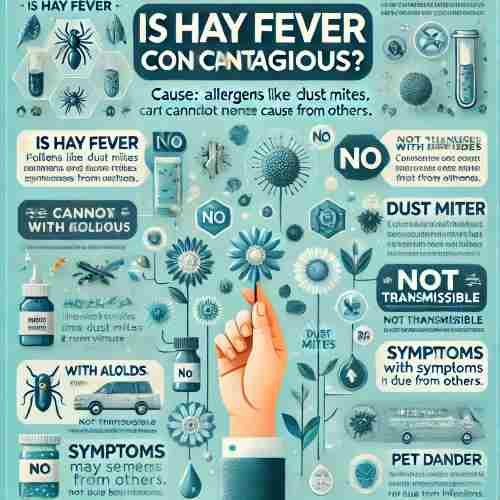
No, hay fever is not contagious. It is an allergic reaction to environmental triggers like pollen, dust mites, animal dander, or mold. Since it’s caused by allergens, you cannot catch hay fever from another person, unlike a cold or flu.
Key Points
- Cause: Hay fever happens due to the immune system’s reaction to allergens such as pollen, dust mites, or pet dander.
- Not Transmissible: You cannot catch hay fever from another person.
- Confusion with Colds: While symptoms like sneezing and a runny nose can look like a cold, hay fever is not an infection.
Recommended Reading: Allergy Medicine For Kids: Types, Uses, And Side Effects
Hay Fever Treatment Options
Hay Fever Treatment Options
Hay fever treatments include antihistamines, decongestants, and nasal sprays to manage symptoms, along with avoiding allergens and using air purifiers for prevention.
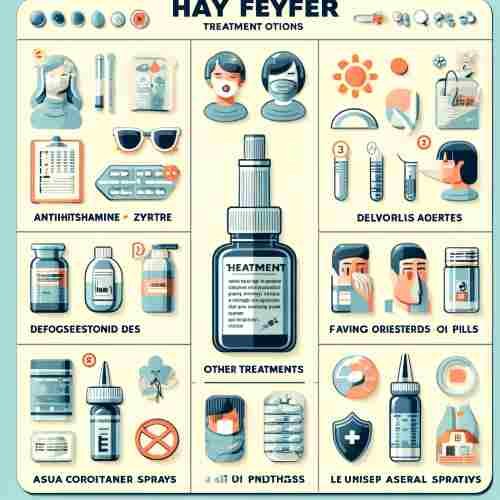
Though hay fever cannot be cured, various treatments can help manage the symptoms.
Medications
- Antihistamines: These block the chemical histamine to reduce symptoms like sneezing and itching. Examples include loratadine (Claritin), cetirizine (Zyrtec), and fexofenadine (Allegra).
- Decongestants: Reduce nasal congestion, available as nasal sprays or pills. However, long-term nasal spray use can cause a rebound effect.
- Nasal Corticosteroids: Effective in reducing inflammation in severe cases.
- Leukotriene Inhibitors: Prescription meds that help both hay fever and asthma.
Other Treatments
- Avoiding Allergens: Stay indoors during high pollen times, close windows, and wear masks or sunglasses when outside.
- Improving Air Quality: Use air purifiers and clean regularly to reduce indoor allergens.
- Saline Nasal Sprays: Help clear allergens from the nasal passages.
Recommended Reading: Allergy Medicine Dogs: Best Allergy Medicine For Dogs Licking Paws
Best Antihistamines For Hay Fever
Best Antihistamines For Hay Fever
The best antihistamines for hay fever include loratadine, cetirizine, and fexofenadine, which help relieve symptoms like sneezing, itching, and a runny nose without causing drowsiness.
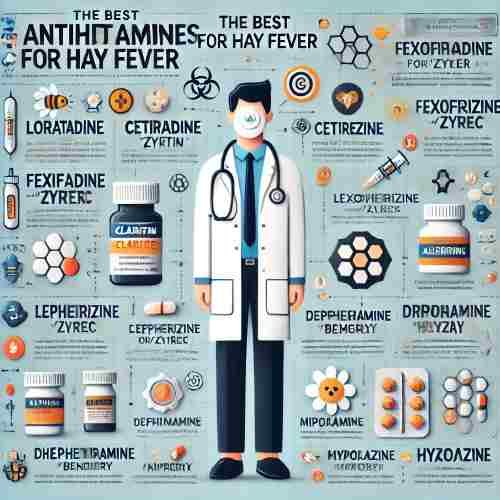
| Antihistamine | Uses | Benefits |
|---|---|---|
| Loratadine (Claritin) | Relieves sneezing, runny nose, and itchy eyes | Non-drowsy lasts 24 hours, good for everyday use |
| Cetirizine (Zyrtec) | Treats hay fever symptoms like itching and hives | Fast-acting, mild drowsiness in some, work within 1 hour |
| Fexofenadine (Allegra) | Reduces sneezing and nasal congestion | Non-drowsy, long-lasting, effective for seasonal allergies |
| Levocetirizine (Xyzal) | Relieves allergy symptoms like watery eyes | Works quickly, long-lasting relief, reduces nasal and eye symptoms |
| Diphenhydramine (Benadryl) | Eases severe allergic reactions | Fast-acting can be used for severe allergies but causes drowsiness |
| Chlorpheniramine | Alleviates hay fever symptoms | Effective for nighttime use, causes drowsiness |
| Desloratadine (Clarinex) | Treats sneezing and runny nose | Long-lasting, non-drowsy, great for seasonal hay fever |
| Acrivastine (Semprex) | Eases itching, sneezing, and runny nose | Short-acting, works well for quick symptom relief |
| Rupatadine (Rupafin) | Treats hay fever symptoms and chronic hives | Anti-inflammatory properties reduce swelling and itching |
| Mizolastine | Alleviates allergic rhinitis and itching | Non-drowsy reduces inflammation, good for daily use |
| Hydroxyzine | Treats severe allergic reactions and itching | Strong sedative effects, best for nighttime use |
Best Tablets For Hay Fever
Best Tablets For Hay Fever
The best tablets for hay fever, such as loratadine, cetirizine, and fexofenadine, help reduce symptoms like sneezing, itchy eyes, and nasal congestion, providing effective relief.

| Tablet Name | Uses | Benefits |
|---|---|---|
| Montelukast (Singulair) | Reduces inflammation and nasal congestion | Effective for hay fever and asthma, helps with breathing and nasal symptoms |
| Fluticasone (Flixonase) | Treats nasal congestion and inflammation | Steroid nasal spray in tablet form reduces swelling and stuffiness |
| Prednisone | Used for severe hay fever symptoms | Powerful anti-inflammatory, short-term relief for severe cases |
| Mometasone (Nasonex) | Relieves nasal symptoms like congestion and sneezing | Steroid that reduces inflammation, have a long-lasting effect |
| Beclomethasone | Reduces inflammation and nasal congestion | Effective for treating nasal symptoms, reduces swelling |
| Cromolyn Sodium | Prevents hay fever symptoms before they occur | Mast cell stabilizer prevents histamine release, non-drowsy |
| Budesonide (Rhinocort) | Reduces nasal inflammation and allergic reactions | Long-lasting, reduces symptoms like sneezing and itchy nose |
| Dexamethasone | Treats severe allergic reactions and inflammation | Potent steroid, used for short-term relief |
| Omalizumab (Xolair) | Treats severe hay fever and asthma | Reduces immune system response to allergens, effective for chronic cases |
| Triamcinolone (Nasacort) | Relieves hay fever symptoms, including nasal issues | Steroid tablet reduces inflammation, long-lasting symptom relief |
| Ephedrine | Reduces nasal congestion and swelling | Acts as a decongestant, helps open airways,and improves breathing |
| Hydrocortisone | Eases severe allergic reactions and inflammation | Strong steroid, helps with severe hay fever symptoms |
Recommended Reading: Best Allergy Medicine For Cats: Types, Uses, & Side Effects
Common Diagnostic Methods For Hay Fever
Common Diagnostic Methods For Hay Fever
Common diagnostic methods for hay fever include allergy skin tests and blood tests to identify specific allergens triggering symptoms, helping determine effective treatment options.
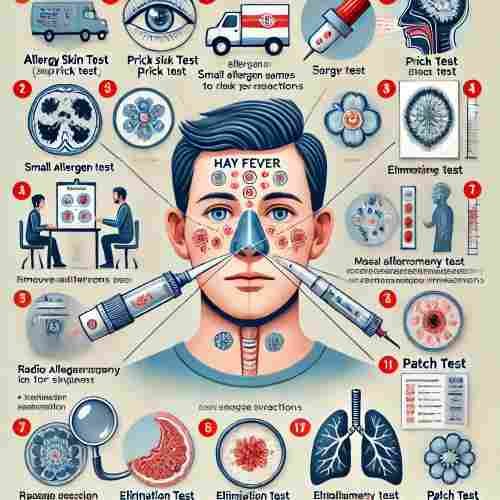
| Diagnostic Method | Uses | Benefits |
|---|---|---|
| Allergy Skin Test (Prick Test) | Identifies specific allergens causing reactions | Quick results, help pinpoint exact allergens |
| Blood Test (IgE Test) | Measures the level of allergy-causing antibodies | Accurate, useful if skin testing isn’t possible |
| Nasal Endoscopy | Examines the nasal passages for signs of inflammation | Non-invasive, helps detect nasal swelling or blockages |
| Physical Examination | The doctor examines the nose, throat, and eyes for symptoms | Easy and immediate, no specialized equipment is needed |
| Nasal Smear Test | Identifies elevated eosinophils (allergic cells) | Simple, confirms if symptoms are allergy-related |
| Elimination Test | Avoids certain allergens to see if symptoms improve | Helps determine which specific allergens are causing symptoms |
| Challenge Testing | Controlled exposure to suspected allergens | Direct and conclusive, confirms specific triggers |
| CT Scan of Sinuses | Provides detailed images of sinuses and nasal area | Helps identify structural issues or severe sinus inflammation |
| Spirometry Test | Measures lung function to rule out asthma | Useful for diagnosing related respiratory conditions |
| Patch Test | Identifies delayed allergic reactions to certain substances | Beneficial for diagnosing allergies not immediately evident |
| Radioallergosorbent Test (RAST) | Detects specific allergen-related antibodies in the blood | Non-invasive, useful for diagnosing hay fever in certain cases |
| Nasal Provocation Test | Allergen is introduced to the nasal passages | Confirms hay fever diagnosis by replicating symptoms |
Recommended Reading: Anti Allergy Medicine For Skin Itching (Uses & Side Effects)
Best Natural Remedies For Hay Fever
Best Natural Remedies For Hay Fever
Best natural remedies for hay fever include using local honey, steam inhalation, and herbal teas like nettle to help alleviate symptoms naturally.
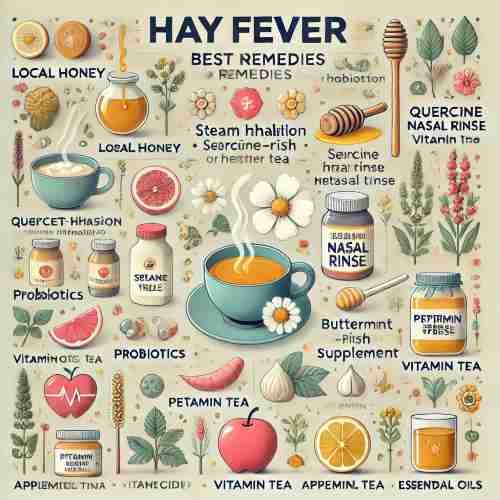
| Natural Remedy | Uses | Benefits |
|---|---|---|
| Local Honey | Consuming small amounts daily to build tolerance to pollen | May reduce sensitivity to local pollen over time |
| Steam Inhalation | Clears nasal passages and reduces congestion | Provides instant relief from blocked nose and sinus pressure |
| Saline Nasal Rinse | Flushes out allergens from nasal passages | Keeps nasal passages clear, reducing sneezing and congestion |
| Quercetin (found in fruits) | Acts as a natural antihistamine | Helps reduce allergy symptoms like sneezing and itching |
| Probiotics | Supports gut health and boosts immune function | May help reduce allergic reactions by balancing immune response |
| Butterbur (Herbal Supplement) | Reduces inflammation and acts as a natural antihistamine | Eases symptoms like nasal congestion and itchy eyes |
| Vitamin C | Acts as a natural antihistamine, reducing histamine levels | Boosts immunity and reduces hay fever symptoms |
| Peppermint Tea | Has anti-inflammatory properties that relieve congestion | Soothes irritated airways and clears nasal blockages |
| Nettle Tea | Acts as a natural antihistamine, reducing inflammation | Eases symptoms such as sneezing, itching, and runny nose |
| Apple Cider Vinegar | Helps thin mucus and relieve nasal congestion | Supports immune health and reduces the severity of hay fever symptoms |
| Garlic | Boosts the immune system and acts as a natural decongestant | May reduce the severity and frequency of hay fever symptoms |
| Essential Oils (Eucalyptus, Lavender) | Inhaled or applied to relieve congestion and calm irritation | Natural anti-inflammatory properties help reduce nasal swelling |
Home Remedies to Stop Hay Fever
| Home Remedy | Uses | Benefits |
|---|---|---|
| Keep Windows Closed | Prevents pollen from entering your home | Reduces exposure to allergens, especially during high pollen days |
| Shower After Going Outside | Removes pollen from skin and hair | Prevents bringing allergens into your home |
| Vacuum Regularly | Removes dust and pollen from carpets and furniture | Keeps indoor air cleaner and reduces allergy symptoms |
| Wear Sunglasses Outdoors | Shields eyes from pollen | Prevents itchy, watery eyes |
| Use Air Purifiers | Cleans the air in your home by removing allergens | Reduces airborne allergens like pollen and dust |
| Cold Compress on Eyes | Soothes irritated, itchy eyes | Reduces swelling and discomfort caused by allergies |
| Change Clothes After Being Outside | Avoids bringing pollen into your home | Reduces continued exposure to allergens |
| Drink Herbal Teas | Calms inflammation and clears nasal passages | Helps with congestion and provides relief from hay fever symptoms |
| Stay Hydrated | Flushes allergens from the system | Keeps mucus thin, reducing congestion |
| Dust with a Damp Cloth | Removes allergens from surfaces | Prevents dust and pollen from being recirculated into the air |
| Use a Humidifier | Adds moisture to the air to help with dry nasal passages | Soothes irritated airways and prevents dryness |
Recommended Reading: Best Allergy Medicine For Kids
Causes of Hay Fever
Hay fever is caused by an allergic reaction to various allergens in the environment. Here are the most common triggers:
- Tree Pollen: Common in spring when trees release pollen.
- Grass Pollen: Peaks during late spring and summer.
- Ragweed Pollen: Typically high in the fall.
- Dust Mites: Microscopic insects found in household dust.
- Animal Dander: Tiny flakes of skin from pets like cats and dogs.
- Mold Spores: Released from indoor and outdoor molds, especially in damp areas.
- Cigarette Smoke: Can aggravate hay fever symptoms.
- Strong Odors: Perfumes, hair sprays, and cleaning products may trigger reactions.
- Air Pollution: Car exhaust and industrial fumes can worsen symptoms.
- Humidity: Warm, humid days tend to increase pollen counts, making symptoms worse.
- Windy Weather: Helps spread pollen and other allergens more easily.
Symptoms of Hay Fever
Symptoms of Hay Fever
Symptoms of hay fever include sneezing, runny nose, itchy eyes, and nasal congestion, often triggered by exposure to allergens like pollen.

Here are the common symptoms:
- Sneezing: Frequent, uncontrollable sneezing is a key symptom.
- Runny or Blocked Nose: Excess mucus or nasal congestion makes breathing difficult.
- Itchy, Red, or Watery Eyes: Allergens in the air cause irritation in the eyes.
- Coughing: Often happens due to mucus dripping down the throat (post-nasal drip).
- Itchy Throat, Mouth, Nose, or Ears: Common discomfort from allergen exposure.
- Loss of Smell: Temporary loss of smell due to blocked nasal passages.
- Fatigue: Feeling tired from persistent discomfort and poor sleep.
- Headaches: Caused by congestion and sinus pressure.
- Sinus Pain: Pressure and pain in the forehead and temples.
- Sore Throat: Irritation from constant coughing and nasal drip.
- Wheezing or Shortness of Breath: Sometimes, hay fever can affect breathing, especially in people with asthma.
Side Effects of Hay Fever
Here are over common side effects:
- Sneezing and Runny Nose: Constant sneezing and a runny nose can be annoying and difficult to manage.
- Itchy Eyes and Throat: Persistent itchiness in the eyes and throat is a common irritation.
- Fatigue: The continuous symptoms often cause tiredness, making you feel worn out.
- Headaches: Nasal congestion can lead to pressure headaches.
- Loss of Smell: Temporary loss of smell happens due to blocked nasal passages.
- Allergic Shiners: Dark circles under the eyes, caused by nasal congestion, are often referred to as allergic shiners.
- Sinus Pressure: Painful pressure in the forehead or cheeks from swollen sinuses.
- Interrupted Sleep: The discomfort of hay fever symptoms can make it hard to sleep properly.
- Sore Throat: Mucus drainage and constant coughing can lead to a sore throat.
- Irritability: The discomfort can make you feel irritable and less focused.
- Ear Congestion: Swelling can block the ear passages, leading to a clogged feeling.
Recommended Reading: Best Allergy Medicine For Dogs Licking Paws
Benefits of Hay Fever Medicines
Medications for hay fever can significantly improve daily comfort by easing symptoms. Here are the key benefits:
- Antihistamines:
- Relief from Sneezing & Itching: Alleviates sneezing, itching, and runny nose effectively.
- Non-Drowsy Options: Many newer antihistamines don’t cause sleepiness, making them suitable for daytime use.
- Decongestants:
- Clear Nasal Blockage: Provides quick relief from a blocked nose, improving breathing.
- Short-Term Use: Ideal for short-term symptom control during flare-ups.
- Nasal Sprays:
- Reduce Inflammation: Corticosteroid sprays target inflammation, reducing congestion and discomfort.
- Long-Lasting Relief: Offers prolonged relief with regular use.
- Mast Cell Stabilizers:
- Prevent Allergy Reactions: Stops the release of histamine, preventing symptoms before they start.
- Safe for Long-Term Use: Provides relief without causing drowsiness or major side effects.
- Quick Symptom Control:
- Many medicines provide rapid relief, letting you continue daily activities without interruption.
- Improved Sleep Quality:
- Reduces nighttime symptoms like congestion, helping with better sleep.
- Enhances Daily Comfort:
- Consistent use helps prevent flare-ups and keeps symptoms under control throughout the day.
Recommended Reading: Natural Allergy Remedies For Eyes
FAQs
What is hay fever?
Hay fever, also known as allergic rhinitis, is an allergic reaction to airborne substances like pollen, dust, and pet dander, causing symptoms like sneezing, itchy eyes, and a runny nose.
Is hay fever contagious?
No, hay fever is not contagious. It is caused by allergens and cannot be spread from person to person like a cold or the flu.
What triggers hay fever?
Common triggers include pollen, dust mites, pet dander, mold, and smoke. Seasonal hay fever is typically triggered by pollen from trees, grasses, and weeds.
What are the main symptoms of hay fever?
Symptoms include sneezing, runny or blocked nose, itchy or watery eyes, coughing, and throat irritation.
How can I treat hay fever?
You can manage symptoms with antihistamines, decongestants, nasal sprays, or natural remedies like saline rinses and air purifiers.
Can hay fever affect sleep?
Yes, the congestion, sneezing, and discomfort can interfere with sleep, leading to tiredness during the day.
Can natural remedies help with hay fever?
Yes, natural remedies like eucalyptus oil, herbal teas, and air purifiers can help reduce symptoms naturally.
Conclusion
Recommended Reading: Best Medicine For Runny Nose And Sneezing
Hay fever, while not contagious, can seriously affect daily comfort. It’s caused by exposure to allergens like pollen, dust mites, and pet dander, leading to symptoms such as sneezing, itchy eyes, and a runny nose.
Although there’s no cure, treatments like antihistamines and nasal sprays can effectively manage symptoms. With the right treatment and preventive measures, hay fever sufferers can reduce its impact and enjoy their day-to-day life with less discomfort.
Disclaimer
Commissions we earn from partner links on this page do not influence our content. Our editorial content is based on thorough research and insights from qualified medical professionals to ensure the highest standards of accuracy and reliability.
Information provided on Doseway is for educational purposes only. Your health and wellness are unique to you, and the products and services we review may not be suitable for your circumstances. We do not offer personal medical advice, diagnosis, or treatment plans. For specific advice, please consult with a healthcare professional. Doseway adheres to strict editorial integrity standards. To the best of our knowledge, all content is accurate as of the date posted, though offers and information may change. The opinions expressed are the author’s own and have not been influenced, approved, or endorsed by our partners.

 Cart is empty
Cart is empty
Add a Comment